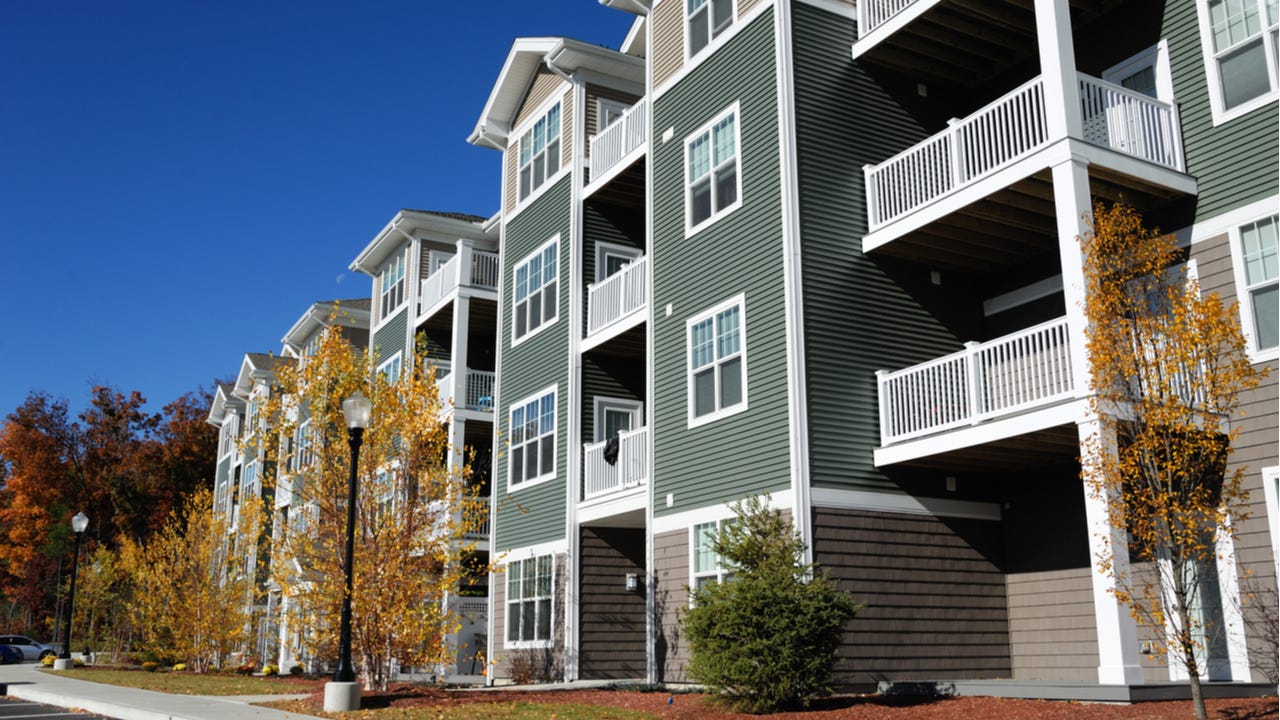What is an FHA-approved condo?

The Bankrate promise
At Bankrate we strive to help you make smarter financial decisions. While we adhere to strict , this post may contain references to products from our partners. Here's an explanation for .
Buying a home or condo with a conventional loan usually means you’ll need a 20 percent down payment, which is a hefty chunk of change. If you can’t come up with that much cash, you have another option: an FHA loan, which is insured by the U.S. government and requires as little as 3.5 percent down. The difference can save you tens of thousands of dollars — for example, on a $300,000 home purchase, 20 percent comes to $60,000, while 3.5 percent is just $10,500.
These low-down payment loans are usually done for single-family homes, but condos are also eligible. Finding FHA-approved condos has historically been difficult, but a rule change that went into effect in 2019 loosened restrictions, making it easier for more condos to meet the eligibility requirements for an FHA loan.
If you’re looking for this type of mortgage on a condo, it’s important to learn what it is and what it means for you as a buyer.
What is an FHA-approved condo?
FHA loans are insured by the Federal Housing Administration. They’re meant for first-time homebuyers or those who haven’t owned property in the last three years. An FHA-approved condo is a condominium that is eligible to be purchased with an FHA loan.
“They are usually the most affordable option,” says Will Rodgers, a real estate agent with Keller Williams Realty in Virginia. “This makes them an especially popular choice for condos, which attract lots of first-time buyers.”
Not all condos offer buyers the chance to finance with an FHA loan, though. Some condo associations aren’t excited about attracting owners who need a lower down payment to qualify, possibly believing those owners are more likely to default.
How to find an FHA-approved condo
Before you buy your dream condo, check whether it’s FHA-approved. You can browse the list of FHA-approved condos on the U.S. Department of Housing and Urban Development’s (HUD) website to find options in your area.
Ashley Romiti, a California real estate agent and VP at Perch Wealth, points out that you shouldn’t forget fees and condo requirements when conducting your research. “Make sure you consider association fees, condo bylaws, cash reserves and amenities,” she says. “Talk to a lender to learn more about the next steps. You will be looking for the lender who offers you the lowest interest rates.”
You’ll want to follow similar steps as you would when seeking any kind of home loan:
- Get your credit score as high as you can before getting preapproved
- Save for a down payment, even if you can only put down the 3.5 percent minimum
- Buy only what you can afford
Also, look for a real estate agent who is not only well-versed in your future neighborhood, but also in FHA approval guidlines.
FHA condo loan requirements
Before you apply for an FHA condo loan, make sure you know what condos need in order to qualify:
- The property or project must be completed — if it’s still in the process of being built, it won’t qualify, according to HUD.
- No more than 50 percent of the development’s units can be used as rentals or owned by investors. Most of the condos should be owner-occupied.
- The property must be insured, and the condo association must keep at least 10 percent of the HOA budget in a cash reserve.
- No more than 35 percent of the property can be for commercial use.
There are other restrictions, too, such as forbidding FHA loans for units in “condotels” (condos that have many hotel-like amenities and rent units to vacationers) or for condos in undesirable areas, such as close to a landfill or airport.
Getting a condo FHA-approved
Condos that are looking to accept FHA financing must go through an approval process and get recertified every three years to remain eligible. Under the new rules, individual condo units can be eligible for FHA loans even if the full development isn’t FHA-approved. This type of single-unit approval is called “spot approval.”
The approval process varies depending on the original structure requesting approval. For instance, older buildings might have a longer approval process than newly completed projects.
Condo developments looking to get approved need to complete the HUD Review and Approval Process (HRAP) or Direct Endorsement Lender Review and Approval Process (DELRAP) for lenders. Once a condo is approved through HRAP or DELRAP, it receives a condo ID and a submission number.
Pros and cons of FHA-approved condos
Pros
- Flexible terms: Like FHA loans for single-family homes, FHA condo loans offer lower down payments and more lenient credit requirements than conventional loans. Plus, the government owns the loan rather than a private lender.
- Affordable options for buyers: HUD estimates that 84 percent of FHA condo buyers have never owned a home before. The more FHA-approved condos there are, the more opportunities for families to own homes and build equity, rather than rent.
- Higher applicant pool: Allowing FHA financing lets condo complexes keep open units to a minimum and increases the number of potential buyers who can be approved for mortgages.
Cons
- Mortgage insurance: Mortgage insurance is required for FHA loans, since buyers are putting down less than 20 percent for a down payment. This increases the cost of an owner’s monthly payments.
- Recertification: For condos, FHA recertification paperwork can be considerable, even though the recertification process now occurs every three years instead of two.
- Limited number of units: “The amount of FHA financing that can be done in a building is not open-ended,” says Esther Phillips, senior vice president of Key Mortgage Services in Chicago. “Only a certain number of condos can be FHA-financed in a non-FHA-approved building.”
FAQs
-
The FHA will approve condos, single-family homes, manufactured homes and mobile homes that meet price requirements. There are separate loan products for mobile homes that are on owned land and those that are in mobile home parks with rented spaces.
-
Yes. These are two separate mortgage products from two separate government agencies: FHA loans are backed by the Federal Housing Administration, while VA loans are backed by the Department of Veteran Affairs. It is possible for a condo to be approved by one but not the other.
-
To qualify for an FHA loan, homebuyers must have a minimum credit score of 500. However, any score between 500 and 579 requires a 10 percent down payment. To be eligible for a 3.5 percent down payment, a borrower’s score must be at least 580 or higher.
Related Articles



